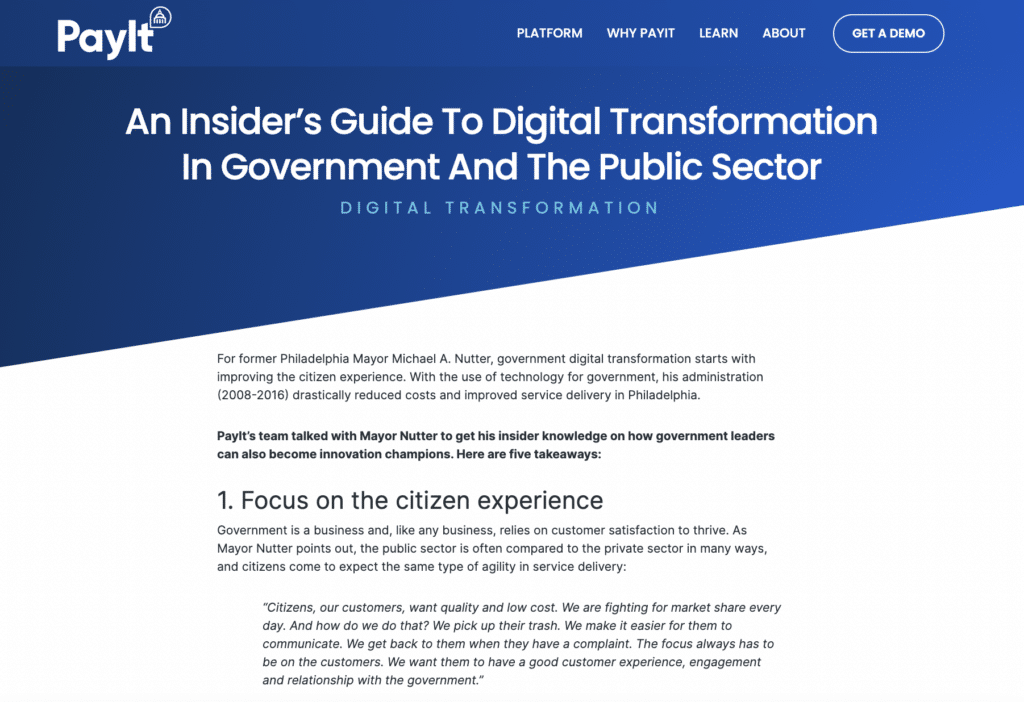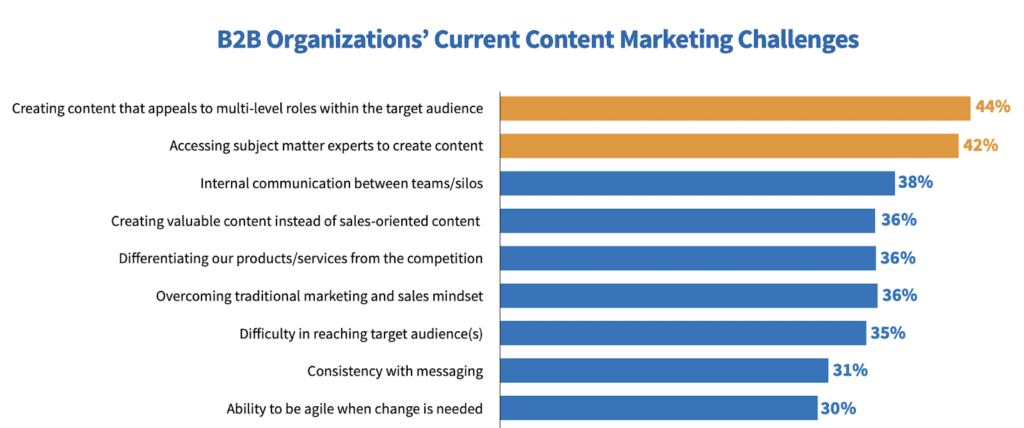A productive partnership between writers and subject matter experts (SMEs) can boost or sink your content marketing success.
No one knows your product or service better than your in-house SMEs. They are your best resource for creating resonating content for your B2B SaaS website. Your subject experts, however, might not have the time or the specific skillset to write copy with search engine optimization (SEO) in mind.
This is where your writing team comes in.
In this post, I’m ready to spill the beans on the secret of our most successful content marketing projects. Hint: it involves SEO writing expertise and effective SME interviews.
Let’s dive in.
How to measure content marketing success
As a B2B SaaS content marketer, you can leverage metrics such as rankings, bounce rates and conversions to assess the success of your SEO efforts. You want to know how your blogs are doing, which keywords they are harvesting, how much time readers spend on pages and where they go next. (You want them to click that demo button, especially if they are at the bottom of the funnel).
In order to outpace the competition for a certain keyword, grow online visibility and convert leads into buyers, you need to continuously output high-quality content that addresses search intent. Of course, you also need to address technical SEO issues if you want to rank well on Google, but I focus solely on content in this post.
⚒️ If you are interested in improving the technical performance of your website, check out our SEO audit guide and checklist.
Ingredients of successful content marketing strategies
To be successful in organic search, B2B content needs to resonate with your ideal customers, either by creating awareness of your product, helping them navigate their pain points or enabling their purchasing decision. The ultimate goal is to build influence, attract leads and convert prospects.
Successful content marketing strategies have these ingredients:
1. Market intelligence and contextual knowledge
Any content marketing strategy should start with a clear understanding of who your buyers are – that’s why you need market intelligence. You will likely put together a buyer personas document detailing their needs, preferences and challenges — information that will help you craft content that resonates with your target audience.
Resonating content requires getting the context right — in other words, you need to understand what your personas care about as well as what your SaaS solution has to offer them. Even though you need to ensure your readers realize how your product could solve their problems, you can’t be salesy. On the contrary, research shows that curbing sales messages is critical to high-quality B2B content.
2. Competitor insights
Also foundational to a winning SEO campaign is having insights into what your competitors are doing. In fact, 41% of marketers surveyed in The State of Content Marketing: 2023 Global Report said that analyzing their competitors have positively influenced their content marketing success.
One of my favorite tactics is to identify what keywords your competitors care the most (for example, their top rankings and/or where they are spending ad money) and write better content about the same topic. This is why, in our copy briefs, we include not only lists of keywords but also “pages to beat.”
Pro tip: If you have access to a tool like Semrush, you can add the URL you want to beat and find out for which keywords that page is ranking. Then make sure to include those terms in your content.
3. Solid SEO structures
For your content to perform well in search, you need to focus not only on what you say but also on how you say it. SEO writing has unique requirements. For example, are readers able to quickly skim through your copy? Are you avoiding keyword stuffing?
Here’s a scenario. If you use your target keyphrase only in the H1 and nowhere else, you won’t rank for that keyword. But overusing the main keyword in all your headings won’t give you results either. Unfortunately, I see these mistakes more often than I’d like to — especially in marketing teams who rely on freelance writers. Be careful: there are so many writers out there who call themselves SEO experts when, in fact, they don’t even get the basics of search optimization right. Knowing SEO is more than placing keywords in a draft. 😉
✍️ Need help writing for SEO? I put together an SEO writing checklist with everything you need to know to start structuring your content for search.
4. The extra ingredient that can spice up content creation
In addition to deep contextual knowledge, market and competitor insights and a solid keyword foundation, there’s an often forgotten ingredient. And it’s an ingredient that can really spice up the recipe of what makes great content marketing: collaboration with subject matter experts.
What is a subject matter expert (SME)?
A subject expert matter is someone who has extensive knowledge and expertise in a particular area or field related to the operations of a business. SMEs are an authority in domains such as product features, latest industry trends, best practices, buyer personas, sales cycles and regulatory requirements.
In curating content for B2B SaaS companies, my team works with multidisciplinary SMEs, from technical team members to C-level executives.
So who is a subject matter expert?
Common types of SMEs in technology startups include:
- Startup cofounders: As the people who started the business, cofounders are the best SMEs to share the vision of the company and the product.
- Product marketing managers (PMMs): Responsible for creating and executing marketing campaigns that promote the product to potential customers. PMMs are in charge of the messaging for the product.
- Sales teams: Responsible for selling the product and closing deals. Sales teams are in touch with prospects and customers and have extensive knowledge about the product, target market, competition and sales cycle.
- Technical teams/engineers: Responsible for the workings of the product. These SMEs have a deep understanding of the product’s technical aspects and the features that are coming up in the pipeline.
Why are subject matter experts important to content marketing?
To understand the importance of SMEs to B2B content marketing, you need to understand first what makes good content. In the 2022 Content Preferences Survey by Demand Generation Report, 39% of the respondents said that B2B vendors should improve content quality by curbing down the sales messages. In addition, 36% of the respondents would like to see more use of data and research to support content and 30% would like to see more insights from industry thought leaders and analysts.
These findings confirm the importance of leveraging SME interviews in your marketing toolset because they enable the creation of content with a foundation in data and expertise. In fact, having access to SMEs can help you focus on both content quantity and quality, which translates into higher rankings along the way.
1. You can publish more content
Content is what drives SEO results, so you need to streamline your process so you can continuously output fresh content. Many of our clients come to us precisely because they want a proven editorial workflow with processes, templates and checklists.
My point? By working with SMEs, you can streamline your work and publish more content. A one-hour interview can give ideas for a couple of blog posts. In fact, that’s what I recommend: book your interviews based on a cluster of topics.
Let’s say that you are writing 1,000-word blog posts. Instead of booking an expert interview for each piece of content, make the most of the interviewee’s time by gathering information for two to three pieces of content at once. This approach works better if you have an editorial calendar organized by clusters – and you focus on a cluster each month.
Keep in mind that 55% of marketers in the State of Content Marketing study said they were able to improve their rankings by creating more content and posting more frequently. And 53% got better ranking results by focusing on boosting content quality. But to truly win the SEO game, you should approach quantity and quality of content as two sides of the same coin.
No matter how great your content is, you won’t achieve results if you post a new blog every quarter. You won’t achieve results either if you post 12 blogs per month – all failing to meet search intent.
👉 Here’s how thin content can hurt your SEO results.
2. You can improve the quality of your content
To rank well in search, you need unique content. There are so many articles out there on the same topic, so leverage deep subject expertise to stand out from the crowd. For 77% of decision-makers in the B2B Thought Leadership Impact Study, high-quality thought leadership features deep subject matter experts delving into specialized topics. Based on the same report, high-performing thought leadership:
- Is authoritative and data-backed.
- Understands the specific needs of your personas.
- Has a more personable tone (not a formal, corporate tone).
- Brings the point of view of an identifiable author.
My point? Access to SMEs can make the difference between creating content for the sake of creating content and outputting real thought leadership. If you want to establish trust, subject matter expertise is key.
👀 The way your brand and team are perceived can make or break a business deal. Read our brand perception guide for all the deets.
3. You can rank higher
Another reason why SME knowledge can supercharge your rankings is that Google takes experience, expertise, authoritativeness and trust (E-E-A-T) into account when rating page quality. With its 2022 helpful content algorithm update, Google made it clear that it would reward original content written by people for people:
“With this update, you’ll see more results with unique, authentic information, so you’re more likely to read something you haven’t seen before.” (Danny Sullivan, Public Liaison for Search, Google)
My point? SME interviews can give you the type of unique, authentic information that makes your articles more valuable.
How to work with SMEs
Here are the most common ways to work with SMEs to achieve B2B content marketing success:
Ghostwriting articles for subject experts
It’s a common practice in the business world to see SMEs lending their names to articles they didn’t write — either because they don’t have time or top-notch writing skills. (In case you are wondering, I did write this blog myself — but I’m a writer, and this article is about writing. If this piece was about design, it would establish more authority having a designer as the attached author rather than a professional writer as its author.)
Authorship adds credibility to content, so make sure that the articles on your website have an author. But to ensure that the content is on point, the ghostwriter needs to interview the person who will byline the article. These interviews with subject matter experts help the writer create a comprehensive and compelling article that accurately reflects insider knowledge and opinions.
✍️ Read our ultimate guide on author pages to learn more about this SEO best practice.
Quoting the SME in your articles
Incorporating SMEs as sources in your content can also add credibility and authority to your piece. If readers recognize the name of the interviewee as an industry insider, they will likely regard the content as more trustworthy.
Top ways to incorporate information from sources into your writing include:
- Summarizing. You condense the main ideas into a shorter version. You omit the details and focus on key takeaways.
- Paraphrasing: You restate the information in your own words. Paraphrasing is often necessary to simplify complex concepts in a way that is easier to understand (for example, getting rid of jargon) or to avoid plagiarism.
- Quoting: You use a source’s exact words, placing them within quotation marks. Quoting is very effective in supporting arguments and capturing the interviewee’s tone or voice.
Here’s an example I like from PayIt, a govtech platform that helps municipal governments digitize their services and operations. This piece on digital government transformation features an interview with a former mayor who is known as an authority in smart city innovation.

What you can get out of subject matter expert interviews
In my experience leading B2B SaaS content projects, you cannot output real thought leadership without being able to connect with subject experts. SMEs can bring the inside knowledge that, as a writer, you need to make your content more authentic, accurate and resonating.
An insider’s nudge could be a small detail, insight or anecdote. Let’s say you are writing about attack surface management, and then the SME might tell you that one of their clients found out that an employee brought a Peloton machine to the office — an unmanaged device that expands the attack surface and exposes the organization to cybersecurity breaches. This type of information adds depth and nuance to your article because it’s a first-hand account.
You can lean on SMEs to:
- Clarify terms and language used in the area of expertise.
- Fill in your gaps in knowledge, walking you through typical workflows and use cases.
- Explain the product in detail and answer all your questions about features and integrations.
- Understand personas’ pain points and the product’s selling points.
- Anticipate the concerns, questions or objections that your audience may have and address them proactively.
- Communicate the state of the competition and help you understand what would make you win or lose a deal to competitors.
- Share the latest industry trends (including technology and regulations).
- Brainstorm ideas for content, so you can build an impactful editorial calendar for your website.
In times of ChatGPT and other AI writing tools, unique content is more critical than ever. By leveraging subject matter expert interviews, you can offer points of view and insights that are clearly not generated by AI. In other words, you can stand out from the crowd.

But what if SMEs are not available?
Collaborating with subject matter experts can make your content stronger, but here’s the catch: you can’t take it for granted either. Accessing SMEs to create content is one of the top challenges for B2B content marketers, per 42% of the respondents of the 12th annual B2B Content Marketing report.

There are platforms that connect writers to SMEs, but if you are part of a B2B SaaS company, you are likely trying to enlist an expert from your own organization. In this case, your best tactic is to educate all stakeholders on the importance of resonating content to generate demand, leads and conversions.
I’ll later discuss the key challenges of working with SMEs, but what you need to know from the start is that SMEs will be more willing to collaborate when it’s clear you are enabling them. Make sure to convey that you will be doing all the heavy lifting and be mindful of the SME’s time.
How to interview subject matter experts for content marketing projects
As a former technology reporter for a daily newspaper, I have conducted hundreds of interviews over my journalism career — with interviewees ranging from Apple cofounder Steve Wozniak to digital have-nots.

Marketing interviews are different, though.
- In journalism, you’ll likely gather multiple perspectives on a story in an attempt to present a balanced view to the audience. Journalists are trained to dig deeper and will be provocative if needed.
- In marketing, your bias is more evident, as you seek to create content that will ultimately promote a product, service or brand — or demonstrate the organization’s thought leadership while seeming to be neutral. The interviewee will likely review and approve the content before publication.
📈 Asking intelligent questions is also an effective way to win SaaS deals. Read our guide to unveil the secrets of question based selling (QBS).

To make the most of the interview process, here’s how to prepare for SME interviews:
Before the interview
- Determine what you need to learn — and from whom. Do you need to understand how a feature works? Or do want to know more about the buyer lifecycle? This type of information helps you figure out who you should be interviewing: an SME from the engineering or sales teams. You might have an intermediary (your point of contact) helping to determine who you should interview or scheduling the meeting for you.
- For example, for my most recent interview, the company’s CEO sent an email introducing me to their director of security, and then I booked the interview myself. But we also have projects in which our project managers are in charge of booking the interviews with the right resources.
- Set expectations on how the interview will be conducted, the amount of time required and how the information will be used.
- Research the person you will be interviewing, including their work, current projects, recent publications or talks. I personally like watching webinars featuring my interviewees. If it’s a high-profile figure, check out their previous interviews and/or read their books. By better understanding their key talking points and perspectives, you can ask informed and relevant questions. This tactic can help you to build a rapport with your interviewee because it shows you did your homework.
- Here’s an example of a question I asked during a past interview: “You have discussed in past interviews and in your book that cities look to each other for inspiration and solutions. You said that mayors talk with each other and adopt each other best practices. What’s the importance of this type of collaboration when it comes to digital transformation? May you give us an example of when you felt inspired by other cities’ best practices and use of technology?”
- Do your homework and prepare your list of questions in advance. Let’s say you have booked a 30min interview. Then prepare questions for 1h interview. You don’t want to run out of questions. Also, ensure you are asking open-ended questions.
- A close-ended question is binary: yes or no. With open-ended questions, the SME might end up mentioning topics that you wouldn’t have thought of. For instance, “How do you see your industry evolving in the next five years?” is a better question than “Do you think your industry will change in the next 5 years?”
- Prepare a brief outline of what you want to cover in the article, so you can test your ideas. The SME will likely appreciate that you have a basic understanding of the topic so you can have a conversation rather than simply being lectured on.
- For example, let’s say you are writing a guide on PCI DSS requirements and you want to include a section on the risks of non-compliance. You did your research and you know what are the top risks. Go over your list with the SME, so they can point out if you are missing any critical information. The expert could even help you understand which risk should come first.
- Share questions or outlines with the SME in advance. Like you, the SME might also want to prepare for the interview so both of you can make the most out of the time. They can think through their answers and gather further resources if needed. This practice helps the SME understand what’s the angle you are pursuing and make suggestions in advance.
- For one of our fintech interviews recently, the SME asked us to change the angle for the article after seeing the questions. Having sent the questions in advance enabled us to adjust our work earlier on in the content process — rather than having to repurpose an entire article after being written.
During the interview
- Explain the purpose of the interview and workflow. Explain the angle you are pursuing and what type of help you need. Clarify the review process. For example, will the SME be able to read the content before publication? When will the first draft be ready?
- Be an active listener and build rapport. Demonstrate interest by paying close attention to responses and by showing signs of listening. Ask follow-up questions to clarify any points you don’t understand, but avoid interrupting or steering the conversation in a particular direction.
- Avoid assumptions. Ask for clarification, examples, scenarios and customer anecdotes. Your list of questions should be a guide rather than a script. In other words, you can and should ask questions that were not initially on your list. But as I said previously, go for open-ended questions.
- Keep the interview on track. Don’t let your interviewee (or yourself) digress — if what’s been said is not going to help you write the article, don’t waste valuable time. Our subject expert interviews, for example, are typically 30min, which is not a lot of time. To make the most out of your interviews, you need to manage the time and ensure your most important questions get answered.
- Leave time for final comments. You should end your interview by asking the SME if there’s anything else they would like to add. Perhaps they want to expand on a topic or weigh in on a point that you may have missed.
- Avoid going over time. If you think you might be running over the allotted time, ask the interviewer if they have a hard stop or if they would be willing to go over a few minutes. But be respectful of their time.
- Take notes and record the SME interview (with permission). The recording will help you capture all the important details and refer back to the interview later if needed.
After the interview
- Thank the subject matter expert and/or your point of contact for their time and insights. If the SME promised to send you supporting data later, follow up. In some cases, you might also be able to send follow-up questions later. However, you should be mindful of the SME’s time. Don’t ask questions whose answers you could find with quick research.
- Review your notes and watch the interview. Make sure you are transcribing the conversation accurately. Try to work on the draft just after the interview so all the information is fresh in your head.
- If you are ghostwriting an article for the SME, make sure to use their vocabulary. In other words, it’s okay to transcribe their own words. I’d paraphrase them only if needed for clarification, grammar or flow. After all, sloppy copy issues such as jargon and lack of precision can hinder your rankings, too.
Lessons learned from working with subject experts in B2B SaaS
Here are my top four lessons learned from working with B2B SMEs across a series of projects in fintech, govtech, cybersecurity and life sciences:
1. Empower the subject matter experts
One of our most successful content marketing strategies has been the creation of cornerstone content in cybersecurity. We output thought leadership articles by working closely with SMEs through the planning, outlining and drafting phases.
For example, when we delivered the first two outlines of a series of posts on cybersecurity asset management, the SME made the recommendation to switch the order of the posts to better align with their new packaging model — something they’ve just introduced. The subject expert then offered to jump on a call to walk us through their new product messaging. He also shared their sales deck with an incredible amount of material to help us enrich the copy.
💭 The lesson: Enable your SMEs and make them feel heard. They will become your champion. That’s how you get them invested and excited about the content creation workflow — and the SEO results.
In the case of this cybersecurity client, project results included a 50% growth in demo requests and over $7 million in lead opportunities. Read our case study on SEO for cybersecurity lead generation for details.
2. Listen and adapt (it’s okay to redo your work)
For one of our govtech startup clients, we were building a government software buyer’s guide to empower their champions with content to advocate for the platform. Our initial idea was to organize a cornerstone page based on the buyer journey (awareness, consideration, decision).
Here’s an overview of what it could have looked like:
- What government platform is – and its benefits
- How to leverage government technology for specific use cases
- Case studies, implementation guide and next steps
Then we interviewed their top government sales executive, who explained to us the typical flow of their procurement process. Based on the SME’s insights, we restructured the content around buyer personas instead. For example:
- Selling points for government leaders
- Key features to bring convenience for end-users of the platform
- Top questions during the IT vetting process
💭 The lesson: Listen to SMEs and adapt. It’s okay to redo work if needed, so you can create more impactful content.
Here at Productive Shop, we only work with SaaS projects, but the buying journeys and personas are not the same. In some industries, for example, IT is the department driving the adoption of new technology; in others, IT is only brought in later to vet for security and compliance. You really need to talk with sales teams to understand this type of nuance.
3. Watch out for SMEs who are blockers
As a digital marketing consultancy, we are brought in because our B2B SaaS clients need help. But very often the person who brought us in (let’s say, the CMO) is not going to be the person who will work closely with our team to move the project forward.
Truth is, sometimes we will deal with blockers — marketers or product team members who are worried about their jobs and the status quo. We’ve seen a fair share of quiet quitters, including SMEs who were not willing to sit down with writers or review content because that would add up to their workload.
When dealing with blockers, you often need to:
- Break the tasks down into smaller, manageable steps or spread the work across different SMEs.
- Go above and beyond to minimize their work; for example, by focusing only on what is really critical.
- Get other stakeholders involved in order to bring visibility to the work that needs to be done and the blocks along the way.
💭 The lesson: Identify the blockers as soon as possible and take proactive measures to not let them slow you down.
📚 The McKinsey Way is a good read for those looking for more insights into how to conduct interviews and work with challenging clients.
4. Plan interviews in advance
For a successful partnership with subject experts, you need spot-on planning. Publishing content might be your priority (you likely have deadlines to manage), but it’s likely not at the top of the list of your SMEs.
One of our clients, for example, keeps rescheduling the interviews with SMEs. This situation is different than the one I previously mentioned about the blockers. Here I’m referring to a great client who really sees the value of connecting our team with their subject experts. But the best person to answer our questions might be on PTO or have a crowded meeting schedule. Add to the list the challenge of working across different time zones (with the point of contact based in California and the SME in Tel Aviv).
💭 The lesson: Book the SME interviews in advance, leaving room for unexpected requests for rescheduling the call, especially if you are dealing with busy executives.
Let’s partner with your SMEs for optimized B2B content
The partnership between writers and SMEs needs to be productive — no pun intended, but yes, Productive Shop can help you with that, too.
Let’s say that your internal teams don’t have the capacity to continuously output fresh content to help you move up on search engine result pages (SERPs). Your subject matter experts might have other priorities and even if they are skilled writers eager to share their thought leadership, they don’t live and breathe SEO best practices. Writing for winning SEO results is a skill set on its own.
Here’s where we come in. After extensive market and keyword research, we build influential editorial calendars to create awareness, address industry pain points and outpace your competition. We then become experts on your SaaS offering ourselves, which means we spend time interviewing your SMEs to pick their brains and create resonating content — optimized for search, of course.
Curious about our templates and proven methods for content marketing success? Partner with us.
Frequently asked questions
What is an SME interview in simple words?
A subject matter expert (SME) interview refers to a conversation with an individual who possesses specialized knowledge in a particular field.
SME interviews are commonly conducted by researchers, journalists, analysts, content creators or professionals seeking information on a specific topic. The interviewer asks questions to gather accurate and reliable information, gain expert opinions, clarify complex concepts or obtain expert insights for a project, article, report or any other form of content creation.
What do subject matter experts do to support data-driven decision-making?
Subject matter experts (SMEs) support data-driven decision-making by:
- Interpreting complex data sets and identifying relevant trends, patterns and benchmarks.
- Contextualizing data within the organization or broader industry.
- Assessing and validating the quality and reliability of data sources and findings.
How to find subject matter experts?
Finding subject matter experts (SMEs) can help you gather reliable information and insights on a particular topic. Consider these top strategies to identify good sources for your articles:
- Start by conducting thorough online research and look for individuals who have published articles, papers or books on the subject you’re interested in.
- Tap into your existing professional networks, such as colleagues and industry contacts. Reach out to people who might have connections or knowledge in the specific field or topic you’re seeking expertise in.
- Leverage LinkedIn to search for subject experts. Use relevant keywords and filters to narrow down your search to specific industries, roles or areas of expertise.
- Check the websites of universities or research institutions and browse through their faculty profiles or research centers to identify experts in your field of interest. You can reach out to them directly via email or by using the contact information provided.
- Contact professional associations or businesses that bring together experts in a particular field. These organizations often have directories or membership lists that you can access to find subject matter experts.
- Work with PR teams, as they maintain databases of experts and can help you connect with the right SME for your specific needs.
SME interview questions: What to ask?
An interview is as good as the questions you ask. For inspiration, check out these simple but effective ways of framing your subject matter expert interview questions:
- Can you help me understand [topic] a little better?
- How do you know that [statemenet]?
- What do you hear from customers that indicate [statement]?
- What do you think are the top reasons for [fact]?
- Could you elaborate on [topic]?
Why and how to become a subject matter expert?
Becoming a subject matter expert (SME) can help you boost your career as you position yourself as a go-to resource and authority. If you want to become an SME, here’s where to start:
- Choose a unique niche. Identify where your interests and strengths lie within a specific industry or field, so you can share your expertise with others.
- Build a strong foundation. Master the core concepts in your field. Take courses and obtain certifications to expand your knowledge base.
- Stay up-to-date. Keep informed about the latest trends, developments and advancements in your field.
- Network with peers. Join professional organizations, associations and communities relevant to your niche. Attend industry events, meetups and conferences to connect with peers.
- Establish your authority. Lead webinars, give interviews, speak at conferences and write thought leadership content that educates and adds value to your audience.
Subject matter expert vs thought leader: what is the difference?
Subject matter experts (SME) and thought leaders are individuals with extensive knowledge and expertise in a specific field or subject. Both are recognized as authorities in their fields. However, not all SMEs are thought leaders.
While subject matter experts focus primarily on their deep knowledge and understanding of a specific field or subject, thought leaders go a step further by actively disseminating their expertise, shaping industry conversations, influencing and inspiring others with their ideas, insights and perspectives.






